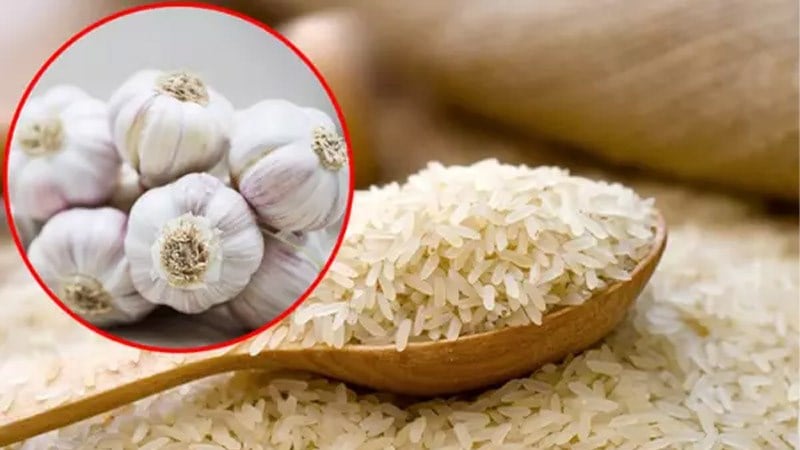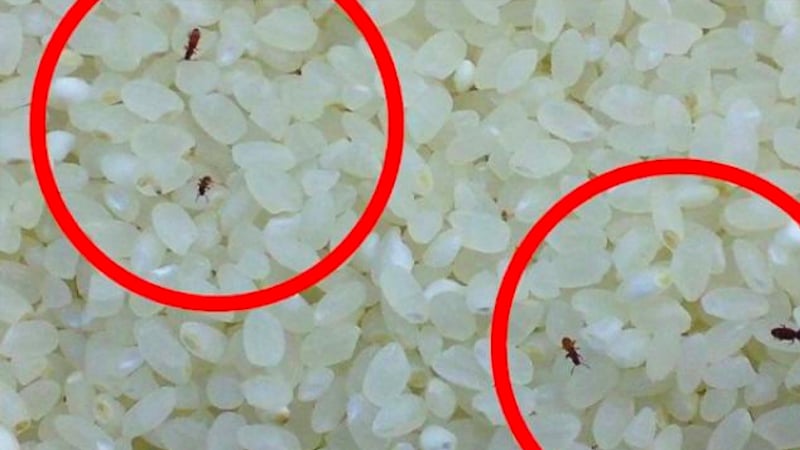How to Store Rice to Prevent Weevils
Many people believe that rice will inevitably become infested with weevils over time, but this is not entirely accurate. Weevils are actually present in rice at the time of purchase. However, they only become noticeable when they hatch and begin feeding on the rice grains.
If rice is newly infested with weevil larvae and the larvae have not yet hatched, cooking the rice will not affect its nutritional value. However, rice that has been infested with adult weevils will have a significantly reduced quality and flavor.

What to Put in a Rice Bin to Deter Weevils
Tea Leaves
A traditional method of preserving rice is to use tea leaves, as they contain a high amount of phenol, which releases an odor that not only deters insects from infesting the rice but also prevents it from becoming stale.
Typically, 10 grams of green tea leaves in a gauze bag is sufficient to preserve 10 kilograms of rice.
Garlic
After peeling dry garlic, place the cloves inside the rice container. Two whole cloves of garlic are usually enough for 10 kilograms of rice.
Although garlic is effective in repelling insects, it will eventually shrivel over time, so it is advisable to replace the cloves monthly to maintain their pest-repelling properties.

Place Peeled Garlic Cloves in the Rice Container
Dried Orange Peel
After eating an orange, save the peel and dry it in the sun for 3-5 days to use as a rice preservative.
Add 2-3 pieces of dried orange peel to every 20 kilograms of rice. This not only effectively repels insects but also prevents the rice from becoming infested with weevils.
Storing Rice with Chili Peppers
Chili peppers are not only used to add flavor to dishes but also to deter weevils in rice. The pungent smell of chili peppers makes weevils uncomfortable and drives them away.

The Pungent Smell of Chili Peppers Deters Weevils
To use this method, cut a chili pepper in half, remove the seeds, and place it in the rice bin.
Storing Rice with Salt
In addition to garlic, salt is also effective in eliminating weevils from rice. When ingesting rice with salt, weevils are deterred by the salty taste and leave the rice.
To use this method, sprinkle a small amount of salt into the rice container. Avoid adding too much salt, as it can make the rice salty and more susceptible to moisture.
Storing Rice in a Dedicated Rice Container
Using a dedicated rice container saves space in your kitchen and allows you to accurately measure the amount of rice needed for each meal while ensuring the safety of your food.
Choose a rice container with a capacity that suits the number of people in your household. Place it in a dry, well-ventilated area, avoiding humid environments and heat-generating appliances such as microwaves and ovens.
How to Treat Rice Infested with Weevils
If you discover that your rice has been infested with weevils, do not expose it to sunlight, as this will cause the weevils to retreat into hiding due to their aversion to light. Additionally, drying the rice in sunlight can cause it to lose moisture and become dry and brittle.
Instead, gently sift the rice to remove the weevils, then spread the rice out in a cool, shaded area with good ventilation to allow the remaining weevils to leave on their own.
More Useful Advice for Homemakers (Part 2)
Have you heard of the surprisingly easy tips to make cooking and household chores simpler? White radish eliminates the acrid taste of salted meat, adding alum to raw shrimp helps soften it, and adding cold water when frying eggs can make them crispy – these are just a few of the tricks to make your life easier.
Is Refrigerated Leftovers Linked to an Increased Risk of Cancer?
Dr. Lam Van Man, Head of Research, Development and Technology Transfer Department of the Institute of Safety Food, has warned of the risk of food poisoning when reheating leftovers from the refrigerator. But what should we be aware of when it comes to the possibility of these leftovers causing cancer? Here, we explore what the experts have to say on the matter and offer some tips for safe eating.





































